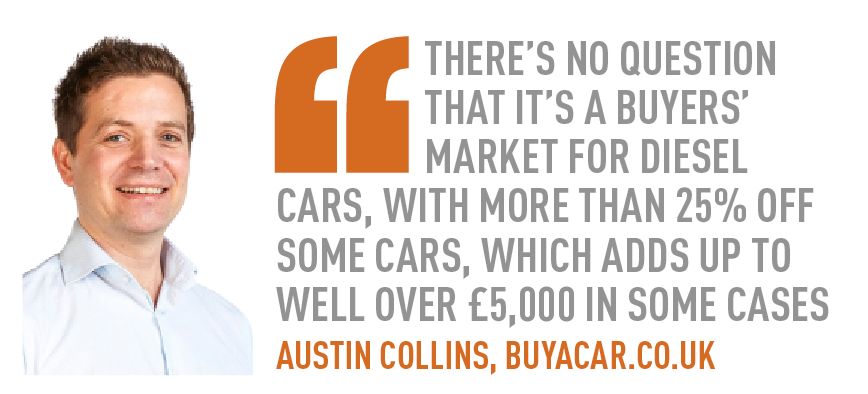Car dealers are racing to revise stocking strategies and demanding “greater clarity” on the future of diesel as the continued fall-out from the NOx emissions scandal and proposed anti-diesel legislation make life awkward for ‘oil burners’ and those who sell them.
Almost two years on from the ‘dieselgate’ Volkswagen emissions- cheating scandal, the momentum against diesel-powered vehicles seems to have continually built, along with the pressure on the Government to reduce the UK’s nitrogen dioxide levels.
Assertions that 50,000 premature deaths a year are caused by NOx emissions, alongside the rush by German premium manufacturers’ to preserve diesel in the short-term by offering their own scrappage-style schemes have fed into consumers’ uncertainty.
This was not helped by the utterly confused communications from the Department for the Environment and Rural Affairs (Defra) in announcing a ban on the sale of new vehicles with “conventional diesel and petrol” engines.
AM sought the opinion of its readers in an attempt to understand the effects of the negativity surrounding diesel-powered vehicles on their businesses.
A shift in diesel demand
The vast majority (87.3%) of franchised dealers said sales of new diesel cars had fallen, with the remaining 12.6% stating sales were unaffected.
In the used sector, almost three quarters (74.5%) said sales of diesel vehicles were down, 24.8% said sales were unaffected and less than 1% of respondents said they had seen volumes rise.
The SMMT reported that demand for new alternative fuel vehicles (AFVs) rose 64.9% year-on-year in July, while registrations of new petrol and diesel cars declined by 3% and 20.1%, respectively.
According to SMMT statistics, used car sales for diesels were flat (-0.1%)for the first half of 2017, at 1,628,045 units, but that figure masks a 5.3% fall in used diesel sales in Q2. However, that performance is better than the overall used car market, which fell 13.5% in Q2.
Statistics from Auto Trader showed that diesel cars had fallen from 71% of total fuel-led searches in November, to 56% in June. Carwow reported a 25% decline in interest in diesel cars since July 2016.
This decline in interest was echoed by respondents to AM’s survey, 76.4% of which said they had seen a decline in the number of enquiries about diesel vehicles and 78.8% had adjusted their stocking policy accordingly.
Discounts were also on the cards, with 75.6% of dealers stating that they had adjusted the pricing of their stock to compensate for the lack of interest in diesel cars.
The shift in pricing strategy is also being adopted by manufacturers.
Carwow reported that sales of diesel vehicles via its online platform rose in July as manufacturer offers enticed savvy car shoppers despite negative press.
Alex Rose, head of trading at Carwow, said: “Carwow has seen a gradual increase in interest in diesel models in July, accounting for 43% of sales, up 3% on June.
“This will be driven in no small part by additional buying incentives from manufacturers, with a 9% relative increase in savings offered on diesel models in July, compared to Q2.”
Austin Collins, managing director of BuyaCar.co.uk, said: “There’s no question that it’s a buyers’ market for diesel cars, with more than 25% off some cars, which adds up to well over £5,000 in some cases.”
NOx in the news
The tide of negative publicity surrounding diesel-powered vehicles gathered momentum after the government published its ‘UK plan for tackling roadside nitrogen dioxide concentrations’ on July 26.
Its effect on the car-buying public was compounded by confusion surrounding Defra’s communication of the headline-grabbing plan to ban the sale of new “conventional petrol and diesel” vehicles from 2040.
Initially reported in the national press as an outright ban on combustion engines, when AM called to seek clarification Defra’s communications department could be heard debating whether hybrid vehicles were included in the ban. They later sent out a clarification of the policy – stipulating that hybrids were not included.
Dr Frederik Dahlmann, an assistant professor of global energy at Warwick Business School who researches the low-carbon economy, said: “There is a good chance the market will have largely shifted towards EV vehicles before the deadline of 2040.”
Scrappage scrapped?
The Government’s clean air plan stopped short of announcing the “targeted” diesel car scrappage scheme it had included in technical notes published alongside its plans published in May.
Respondents to AM’s survey had a mixed response to the prospect of a scrappage scheme, with 49% suggesting it would boost sales. However, more than a third (37.9%) felt it would have no effect and 13% said they were unsure of its potential effects.
Perhaps this was down to the “targeted” nature of the earlier Government proposals, which suggested that only owners of older diesel cars in areas with the highest NOx pollution would be eligible for the scheme.
When asked if any Government scrappage scheme should be applied nationally, 84.2% said it should.
The Government’s proposals to meet EU NOx emissions targets made local authorities the focus of much of the clean air plan, requiring them to produce a study of local air quality and a plan to reduce NOx levels, including charging zones or outright bans for certain vehicles as a last resort.
The Government announced a £255 million ‘implementation fund’ to help authorities make the changes.
“It is for local authorities to develop innovative local plans that will achieve statutory NO2 limit values within the shortest possible time,” the clean air plan states.
Changes to the taxation of diesel vehicles was part of the government policy and an announcement is expected to be made by the Chancellor of the Exchequer, Philip Hammond, in his Autumn Statement. Until then, diesel vehicles’ immediate future remains uncertain.
This uncertainty was made clear in comments left by dealers who responded to AM’s survey.
“I feel the Government should be more clear on their intentions and time scale on any changes they are bringing in, so customers know what changes there will be,” said one respondent.
Another wanted answers to help guide their own plans, stating: “I would like to see clarity. What is happening with diesel-powered vehicles?”
Manufacturers’ action
Public perception of the carmakers’ race towards AFVs may be working against car retailers’ diesel car sales, with many consumers considering a move in the same direction.
In August, Volvo targeted one million electrified car sales by 2025 after announcing that all of its new products will include an element of EV technology from 2019, while Volkswagen has also said its long-term future lies in EVs.
Respondents to AM’s survey revealed that few manufacturers had revealed an intention to abandon diesel in the long term, with almost three quarters (71.55%) suggesting such plans had not been shared.
Some dealers were aware of such changes at Volvo (9.5%), Audi (5.2%), Ford (4.3%), Mercedes-Benz (3.5%), Volkswagen (6.9%), however.
For now, some manufacturers are intent on preserving the immediate future of diesel.
German premium car manufacturers have come to an agreement with German authorities to begin voluntary recalls to implement NOx-cutting software updates and scrappage-style incentives to customers moving into cleaner vehicles.
Mercedes-Benz will carry out NOx emissions-limiting software upgrades to three million diesel vehicles across Europe, and Audi will do the same to 850,000.
BMW has brought its scrappage-style scheme to the UK. Until the end of December, customers will benefit from a discount of up to £2,000 when trading in any Euro 4 or earlier diesel car for a BMW emitting below 130g/km CO2 emissions (more than 80% of BMW’s range and almost 70% of Mini’s).
AM’s readers clearly want to see more education of consumers about the emission-cutting advances in Euro 6 diesels. Some 79% of respondents said they had made efforts to educate their customers.
However, dealers were less impressed with their manufacturers’ and representative bodies’ efforts – 81% said their OEM partners were not doing enough to sway opinion and 87% said the same of the SMMT, NFDA, RMI and IMI.
One survey respondent summed up the mood among dealers, stating: “It’s down to the manufacturers, the industry bodies and in particular, the media, to educate the public as to what the real score with diesel is.
“The Government have handled this very badly by making announcements months before any specifics.
“The public don’t have a clue as to what’s what with diesel cars.”















Login to comment
Comments
No comments have been made yet.